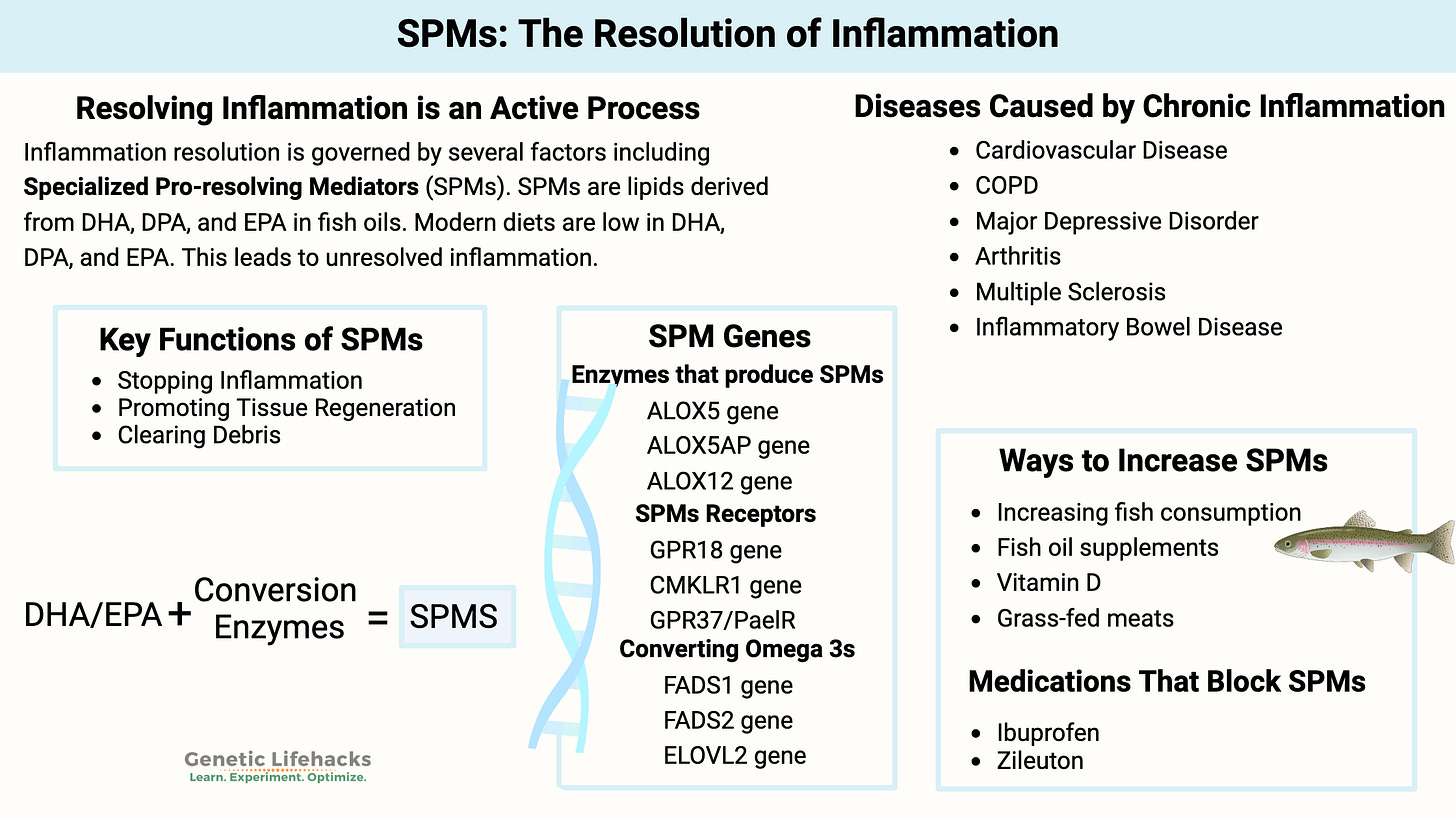SPMs, SNPs, and the Science of Resolving Chronic Inflammation
In our modern world, the biggest health threats aren't infections or the plague - they're chronic diseases such as heart disease, diabetes, neurodegeneration, gingivitis, asthma, pancreatitis, aFib, and arthritis.
Our immune system is designed to fight off viruses and bacteria, as well as to repair injuries, through a strong inflammatory response. But when the inflammatory response is excessive or lasts longer than it should, inflammation turns into a harmful force. That's where many chronic illnesses begin - with lingering, chronic inflammation.
What is overlooked is that the resolution of inflammation is just as important as the initiation. As soon as the body begins to mount an inflammatory response - say to a cut or damage to the blood vessel lining - it also begins the active process of resolution. Specialized lipid molecules known as Specialized Pro-resolving Mediators (SPMs) put the brakes on inflammation as well as initiate the repair process. These SPMs are synthesized from omega-3 fatty acids, DHA and EPA.
But here's the problem: Modern diets high in omega-6 oils and low in omega-3s can lead to a lack of pro-resolving mediators.
For some people, genetic variants can decrease their ability to synthesize SPMs, and in conjunction with a lack of dietary DHA and EPA, these variants increase their relative risk of chronic diseases that are rooted in inflammation.
However, it isn't as simple as taking high-quality fish oil supplements (although that can be part of the solution).
The other half of the picture is your genetic susceptibility to elevated inflammatory cytokines. Variants in the gene that encode key inflammatory cytokines - like TNF-alpha, IL-1beta, or NLRP3- can increase your body's inflammatory response. Add to this any genetic predispositions to specific diseases, like coronary artery disease, and you begin to see how these factors can converge into a "perfect storm" for health issues.
Added to this are other genetic susceptibility variants for specific chronic diseases. For example, if you have a genetic propensity for depression, coupled with low pro-resolving mediators and high TNF, you could have the recipe for major depressive disorder.
Members often ask for just a list of supplements to take for a specific SNP. But it's more complicated than that.
Wellness isn't about just targeting individual genes or taking isolated nutrients. It's about understanding the whole picture: the interactions between your genetic susceptibility, your diet, environmental exposures, your gut microbiome, and even your circadian rhythm.
So this week as you read through the article on the resolution of inflammation as an active process, think about how this connects to all of your other genetic variants.
Stay curious,
~ Debbie
Specialized Pro-resolving Mediators (SPMs): The Resolution of Inflammation
Key takeaways:
~ Resolving inflammation is an active process: The body doesn’t just let inflammation fade away; it actively produces specialized pro-resolving mediators (SPMs) to end inflammation and restore tissue health
~ SPMs are lipid molecules synthesized from dietary omega-3s—mainly DHA and EPA—which are often lacking in modern diets.
~ A lack of pro-resolving mediators can allow inflammation to continue, leading to many chronic diseases.
~ Genetic variants can affect how efficiently your body converts dietary fats into SPMs, meaning some people may need more DHA/EPA or benefit from specific supplement forms.
New on Longevity Lifehacks:
Plus, I've updated my Genetic Lifehacks article with new Klotho studies and more genetic variants.
What I've been reading:
An animal study on glyphosate at levels under the EU drinking water limit showed an increased cancer rate. Carcinogenic effects of long-term exposure from prenatal life to glyphosate and glyphosate-based herbicides.
Related GL article: Glyphosate detoxification genes
More new research on the mechanism by which nanoplastic particles cause 'leaky gut'. This detailed study (in mice) shows that the nanoplastic particles change the levels of specific microRNAs, which change zonulin and mucin levels. Zonulin is important for tight junctions between the cells that line the intestines, and mucins are what make up the mucosal barrier in the intestines.
Related GL article: Microplastics and nanoplastics




EXCELLENT post, thank you so much. Opened up a whole new perspective.